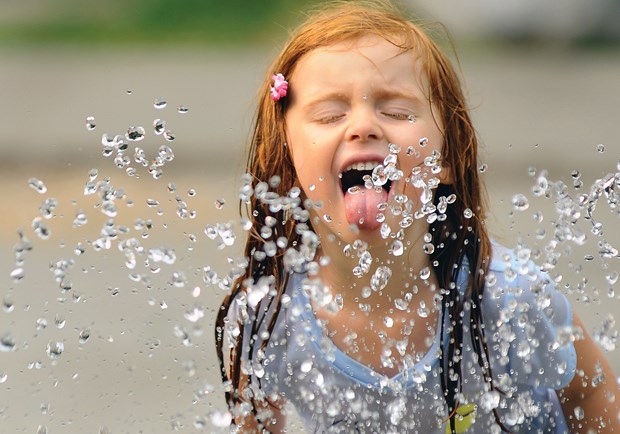Brown is the new green in the Lower Mainland.
All sprinkling is now banned as Metro Vancouver moved to further restrict outdoor water use Tuesday in response to a record-breaking summer drought and falling reservoir levels.
It’s the first time in 12 years the regional government has put Stage 3 water restrictions in place and the first time that’s happened so early in the summer.
Water levels in the Lower Mainland’s three main water reservoirs were sitting at 69 per cent on Tuesday while water use was sitting at just below 1.5 billion litres per day. Those looking after the region’s water system would like to see that drop below 1.2 billion litres per day, said Darrell Mussatto, mayor of the City of North Vancouver and chair of Metro Vancouver’s utilities committee.
The regional government tightened water restrictions this week after water administrators updated their computer models, plugging the almost complete lack of rain in May, June and July into their forecasted reservoir levels. “It showed we are in uncharted territory,” said Mussatto. “It said we were, in the middle of July, at end-of-August levels.
“We’re using too much water,” he said. “I think it would be fair to say we’re concerned.”
To deal with the falling reservoir levels, Metro Vancouver technicians recently flew up to Palisade Lake, one of the region’s backup alpine water sources, and opened the valve to release water down into the Capilano Reservoir.
That lake will only be drained 50 per cent, said Mussatto, to ensure it has a chance to recharge in the winter. If needed, crews can also tap into Burwell Lake and Loch Lomand, alpine water sources that drain into the Seymour Reservoir. Metro Vancouver has also requested more than 60 billion additional litres in the Coquitlam Reservoir be set aside by BC Hydro for possible drinking water supply. Hydro has stopped all power generation from that reservoir during the drought.
But local politicians and water managers are hoping that cutting down on water consumption will be a big part of the solution.
Under Stage 3 restrictions there are a lot of “nos” to contend with in an area where water is usually plentiful. No car washing. No pressure washing, except to prepare surfaces for paint. No sprinkling, even on new lawns or those where nematodes have recently been applied to combat chafer beetles. No refilling of swimming pools and hot tubs. No running through the sprinkler.
Kids’ water parks with user-activated sprinklers will still be allowed. There is also minimal sprinkling allowed on golf courses and on fields that would become unusable or ruined without some water.
Commercial car washes that recycle water are still allowed. Industrial and commercial users, which pay for water through water metering, also won’t be affected.
For Scott Stephenson, owner of West Coast Home Services in North Vancouver, the Stage 3 restrictions are definitely affecting the bottom line.
About 60 per cent of the company’s business is pressure washing. “It’s affected us dramatically,” he said, adding he’s already had to lay off two employees.
“We just lost a contract that was set up for August,” he said, adding some clients don’t even want to proceed with work that would be allowed under the water restrictions, for fear of public shaming.
“The phone calls have stopped,” he said.
At the Capilano Golf and Country Club in the British Properties, general manager Brad Burgart said the club is fortunate to have a provincial water licence of many years’ standing in place on two small nearby lakes, so it doesn’t have to tap into regional water sources.
“The water we use is predominantly non-treated water,” he said. “But we do have to manage it. It’s a little browner than usual.”
Current water restrictions have municipal water managers on the North Shore looking more carefully at exactly who is using water and finding ways to remind — and in some cases ticket — those who don’t comply with regulations.
Gavin Joyce, manager of parks, engineering and facilities at the District of North Vancouver, said the municipality has sent out nearly 500 letters to homeowners for reportedly violating sprinkling regulations.
Most of those people get a warning, he said, although two homeowners earned $100 tickets for repeat offences. In West Vancouver, 82 homeowners have received warnings, although none have been ticketed yet.
Sprinkling is targeted first because “the outside watering is a large percentage of people’s water consumption,” said Joyce.
“It’s the single biggest thing we can make a change to.”
While the top 10 industrial and commercial users account for about 25 per cent of the district’s water use annually, residential use is heavily skewed to outdoor water use in the summer months, said Shaun Caroll, utilities manager for the District of North Vancouver.
Of the approximately 300 litres per capita per day consumed by residential users, 40 per cent of that is used during the three summer months of June, July and August, she said, adding that reducing that consumption can make a real difference.



